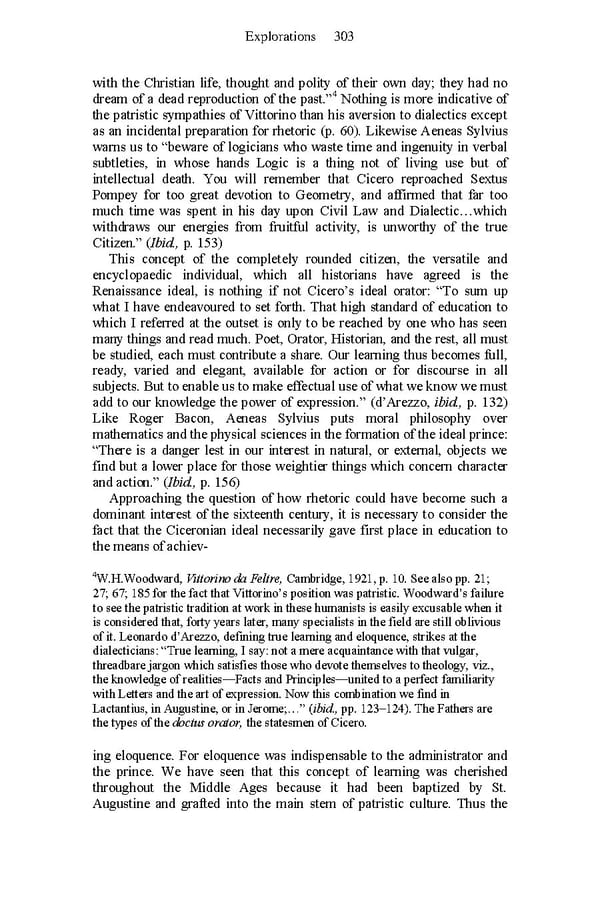Explorations 303 with the Christian life, thought and polity of their own day; they had no 4 dream of a dead reproduction of the past.” Nothing is more indicative of the patristic sympathies of Vittorino than his aversion to dialectics except as an incidental preparation for rhetoric (p. 60). Likewise Aeneas Sylvius warns us to “beware of logicians who waste time and ingenuity in verbal subtleties, in whose hands Logic is a thing not of living use but of intellectual death. You will remember that Cicero reproached Sextus Pompey for too great devotion to Geometry, and affirmed that far too much time was spent in his day upon Civil Law and Dialectic…which withdraws our energies from fruitful activity, is unworthy of the true Citizen.” (Ibid., p. 153) This concept of the completely rounded citizen, the versatile and encyclopaedic individual, which all historians have agreed is the Renaissance ideal, is nothing if not Cicero’s ideal orator: “To sum up what I have endeavoured to set forth. That high standard of education to which I referred at the outset is only to be reached by one who has seen many things and read much. Poet, Orator, Historian, and the rest, all must be studied, each must contribute a share. Our learning thus becomes full, ready, varied and elegant, available for action or for discourse in all subjects. But to enable us to make effectual use of what we know we must add to our knowledge the power of expression.” (d’Arezzo, ibid., p. 132) Like Roger Bacon, Aeneas Sylvius puts moral philosophy over mathematics and the physical sciences in the formation of the ideal prince: “There is a danger lest in our interest in natural, or external, objects we find but a lower place for those weightier things which concern character and action.” (Ibid., p. 156) Approaching the question of how rhetoric could have become such a dominant interest of the sixteenth century, it is necessary to consider the fact that the Ciceronian ideal necessarily gave first place in education to the means of achiev- 4 W.H.Woodward, Vittorino da Feltre, Cambridge, 1921, p. 10. See also pp. 21; 27; 67; 185 for the fact that Vittorino’s position was patristic. Woodward’s failure to see the patristic tradition at work in these humanists is easily excusable when it is considered that, forty years later, many specialists in the field are still oblivious of it. Leonardo d’Arezzo, defining true learning and eloquence, strikes at the dialecticians: “True learning, I say: not a mere acquaintance with that vulgar, threadbare jargon which satisfies those who devote themselves to theology, viz., the knowledge of realities—Facts and Principles—united to a perfect familiarity with Letters and the art of expression. Now this combination we find in Lactantius, in Augustine, or in Jerome;…” (ibid., pp. 123–124). The Fathers are the types of the doctus orator, the statesmen of Cicero. ing eloquence. For eloquence was indispensable to the administrator and the prince. We have seen that this concept of learning was cherished throughout the Middle Ages because it had been baptized by St. Augustine and grafted into the main stem of patristic culture. Thus the
 Essential McLuhan Page 309 Page 311
Essential McLuhan Page 309 Page 311